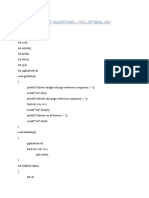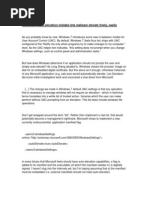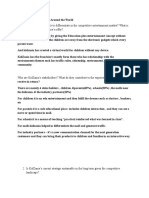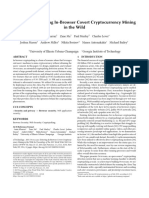Program-7 - Page Replacement Algorithms
Uploaded by
sreelakshmikn33Program-7 - Page Replacement Algorithms
Uploaded by
sreelakshmikn33Department of Computer Science Engineering – ( Data Science)
Program 7: Develop a C program to simulate page replacement algorithms
a) FIFO b) LRU
Paging
Paging is a memory management technique used by operating systems to optimize computer
memory usage.
This technique divides the memory into small pages, and each process is allocated a set of
pages. Pages can be swapped in and out of memory as needed, which helps to improve memory
utilization.
Page Replacement Algorithms
In operating systems that use paging for memory management, page replacement algorithm are
needed to decide which page needed to be replaced when new page comes in.
Whenever a new page is referred and not present in memory, page fault occurs and Operating
System replaces one of the existing pages with newly needed page.
Different page replacement algorithms suggest different ways to decide which page to replace.
The target for all algorithms is to reduce number of page faults.
Operating Systems Lab[BCS303] 1
Department of Computer Science Engineering – ( Data Science)
First In First Out (FIFO) page replacement algorithm
This is the simplest page replacement algorithm. In this algorithm, operating system keeps track
of all pages in the memory in a queue, oldest page is in the front of the queue.
When a page needs to be replaced page in the front of the queue is selected for removal.
Example : Consider page reference string 1, 3, 0, 3, 5, 6 and 3 page slots.
- Initially all slots are empty, so when 1, 3, 0 came they are allocated to the empty slots so
3 Page Faults.
- when 3 comes, it is already in memory so 0 Page Faults.
- Then 5 comes, it is not available in memory so it replaces the oldest page slot i.e 1. So 1
Page Fault.
- Finally 6 comes, it is also not available in memory so it replaces the oldest page slot i.e 3
so 6 Page Fault.
- So total page faults = 5.
F1 1 1 1 5 5
F2 3 3 3 6
F3 0 0 0
Program:
#include<stdio.h>
int main()
{
int i,j,n,a[50],frame[10],no,k,avail,count=0;
printf("\n ENTER THE NUMBER OF PAGES:");
scanf("%d",&n);
printf("\n ENTER THE PAGE NUMBER :");
for(i=1;i<=n;i++)
scanf("%d",&a[i]);
printf("\n ENTER THE NUMBER OF FRAMES :");
scanf("%d",&no);
for(i=0;i<no;i++)
frame[i]= -1;
j=0;
printf("\tRef string\t page frames\n");
Operating Systems Lab[BCS303] 2
Department of Computer Science Engineering – ( Data Science)
for(i=1;i<=n;i++)
{
printf("%d\t\t",a[i]);
avail=0;
for(k=0;k<no;k++)
if(frame[k]==a[i])
avail=1;
if (avail==0)
{
frame[j]=a[i];
j=(j+1)%no;
count++;
for(k=0;k<no;k++)
printf("%d\t",frame[k]);
}
printf("\n");
}
printf("Number of Page Fault is: %d",count);
return 0;
}
Sample Output:
ENTER THE NUMBER OF PAGES: 6
ENTER THE PAGE NUMBER : 1 3 0 3 5 6
ENTER THE NUMBER OF FRAMES :3
ref string page frames
1 1 -1 -1
3 1 3 -1
0 1 3 0
3
5 5 3 0
6 5 6 0
Number of Page Fault is: 5
Operating Systems Lab[BCS303] 3
Department of Computer Science Engineering – ( Data Science)
Least Recently Used(LRU) Algorithm
This algorithm is based on the strategy that whenever a page fault occurs, the least recently used
page will be replaced with a new page.
So, the page not utilized for the longest time in the memory (compared to all other pages) gets
replaced.
Example: Let say the page reference string 7 0 1 2 0 3 0 4 2 3 0 3 2 . Initially we have 4 page
slots empty.
- Initially all slots are empty, so when 7 0 1 2 are allocated to the empty slots so 4 Page
faults
- 0 is already there so 0 Page fault.
- when 3 came it will take the place of 7 because it is least recently used so1 Page fault
- 0 is already in memory so 0 Page fault.
- 4 will takes place of 1so 1 Page Fault
- Now for the further page reference string so 0 Page fault because they are already
available in the memory.
Operating Systems Lab[BCS303] 4
Department of Computer Science Engineering – ( Data Science)
Program
#include<stdio.h>
main()
{
int q[20],p[50],c=0,c1,d,f,i,j,k=0,n,r,t,b[20],c2[20];
printf("Enter no of pages:");
scanf("%d",&n);
printf("Enter the reference string:");
for(i=0;i<n;i++)
scanf("%d",&p[i]);
printf("Enter no of frames:");
scanf("%d",&f);
q[k]=p[k];
printf("\n\t%d\n",q[k]);
c++;
k++;
for(i=1;i<n;i++)
{
c1=0;
for(j=0;j<f;j++)
{
if(p[i]!=q[j])
c1++;
}
if(c1==f)
{
c++;
if(k<f)
{
q[k]=p[i];
k++;
for(j=0;j<k;j++)
printf("\t%d",q[j]);
printf("\n");
}
else
{
for(r=0;r<f;r++)
{
c2[r]=0;
Operating Systems Lab[BCS303] 5
Department of Computer Science Engineering – ( Data Science)
for(j=i-1;j<n;j--)
{
if(q[r]!=p[j])
c2[r]++;
else
break;
}
}
for(r=0;r<f;r++)
b[r]=c2[r];
for(r=0;r<f;r++)
{
for(j=r;j<f;j++)
{
if(b[r]<b[j])
{
t=b[r];
b[r]=b[j];
b[j]=t;
}
}
}
for(r=0;r<f;r++)
{
if(c2[r]==b[0])
q[r]=p[i];
printf("\t%d",q[r]);
}
printf("\n");
}
}
}
printf("\nThe no of page faults is %d",c);
}
Sample output
Enter no of pages:10
Enter the reference string:7 5 9 4 3 7 9 6 2 1
Enter no of frames:3
7
7 5
7 5 9
Operating Systems Lab[BCS303] 6
Department of Computer Science Engineering – ( Data Science)
4 5 9
4 3 9
4 3 7
9 3 7
9 6 7
9 6 2
1 6 2
The no of page faults is 10
Operating Systems Lab[BCS303] 7
You might also like
- Assessment: 5: Ite 2002-Operating Systems Lab Lab Assessment QuestionsNo ratings yetAssessment: 5: Ite 2002-Operating Systems Lab Lab Assessment Questions16 pages
- Lab Da-4 Dr. Priya M Rajat Srivastava 19BCE2055No ratings yetLab Da-4 Dr. Priya M Rajat Srivastava 19BCE205531 pages
- character Stuffing:-: Department of CSE Computer Networks Lab Sheet NoNo ratings yetcharacter Stuffing:-: Department of CSE Computer Networks Lab Sheet No15 pages
- Write A Program To Check Whether The String Belongs To The Grammar or NotNo ratings yetWrite A Program To Check Whether The String Belongs To The Grammar or Not33 pages
- C Program For FIFO Page Replacement AlgorithmNo ratings yetC Program For FIFO Page Replacement Algorithm2 pages
- #Include Int Int Int: Program:Write A C Program To Implement Deadlock Detection AlgNo ratings yet#Include Int Int Int: Program:Write A C Program To Implement Deadlock Detection Alg11 pages
- System Software Rohan Ashra Scheduling 11811116 Roll No 05: 1.first Come First ServeNo ratings yetSystem Software Rohan Ashra Scheduling 11811116 Roll No 05: 1.first Come First Serve19 pages
- UCS 1411 - Operating Systems Lab Exercise 10 - Paging Replacement TechniqueNo ratings yetUCS 1411 - Operating Systems Lab Exercise 10 - Paging Replacement Technique13 pages
- Green University of Bangladesh: Department of Computer Science and EngineeringNo ratings yetGreen University of Bangladesh: Department of Computer Science and Engineering9 pages
- Program To Implement Shortest Job First (Preemptive)No ratings yetProgram To Implement Shortest Job First (Preemptive)12 pages
- Creating Watchpoints While Debugging The ABAP Code1 PDFNo ratings yetCreating Watchpoints While Debugging The ABAP Code1 PDF2 pages
- Equotip Piccolo Bambino 2 - Operating Instructions - English - HighNo ratings yetEquotip Piccolo Bambino 2 - Operating Instructions - English - High32 pages
- Creating Video For The Web: Tips, Tricks and Tools For Telling Amazing Stories100% (1)Creating Video For The Web: Tips, Tricks and Tools For Telling Amazing Stories16 pages
- 19-Normalization and Previous Year QP-23-08-2024No ratings yet19-Normalization and Previous Year QP-23-08-20242 pages
- Performance Tuning Linux Instances On EC2No ratings yetPerformance Tuning Linux Instances On EC24 pages
- All India Email Directory, Database (7th Edition) (.XLSX, Excel Format)No ratings yetAll India Email Directory, Database (7th Edition) (.XLSX, Excel Format)11 pages
- Modales - Last Term Exam - B1 - 2019 - 1 PDFNo ratings yetModales - Last Term Exam - B1 - 2019 - 1 PDF4 pages
- CV4011-PT1 Lecturenote 4-Or - CPM 1516 S1No ratings yetCV4011-PT1 Lecturenote 4-Or - CPM 1516 S117 pages

























































































